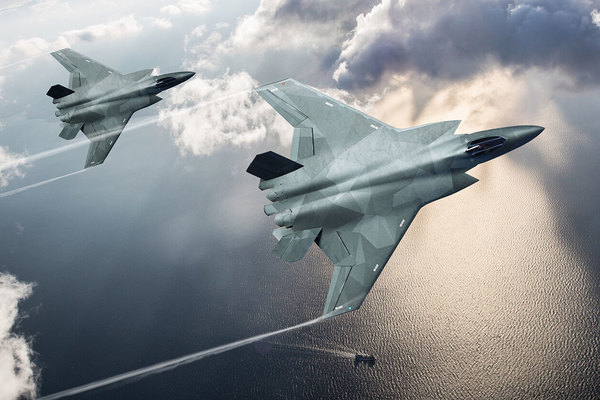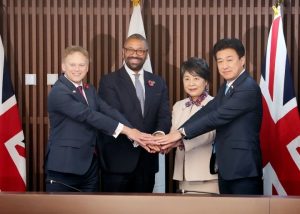The foreign and defense ministers of Japan and the United Kingdom have agreed on a series of measures to further deepen their bilateral defense cooperation through joint exercises and a project to jointly develop a next-generation fighter jet.
The fifth Japan-U.K. Foreign and Defense Ministerial Meeting, informally known as “two-plus-two” talks, took place on November 7 in Tokyo. Japan’s Foreign Minister Kamikawa Yoko and Defense Minister Kihara Minoru met with their British counterparts, James Cleverly and Grant Shapps.
The four ministers focused on the Global Combat Air Program (GCAP) – through which Japan, the United Kingdom, and Italy seek to develop a sixth-generation fighter jet by 2035 – and laid the foundation for the signing of the treaty that will kickstart the project. The British defense minister said the signing would happen before the end of 2023.
Specifically, the three countries aim to sign a treaty on the establishment of a joint development organization. The Japanese government plans to submit a draft treaty to next year’s regular Diet session, with development work beginning in earnest with the aim of deployment in 2035.

This handout image from BAE Systems provides a computer-generated concept of the sixth-generation fighter.
According to the Japanese Ministry of Defense, the four ministers confirmed that Japan’s Self-Defense Forces and the British Armed Forces will conduct more complex and advanced exercises frequently, as the so-called Reciprocal Access Agreement aimed at smoothing cooperation already took effect on October 15.
In particular, the ministers noted that the Japan-U.K. RAA would be first applied to the bilateral field training exercise “Vigilant Isles 23.” The exercise, involving the Japan Ground Self-Defense Force and the British Army, will take place in Japan starting on November 15.
A similar agreement between Japan and Australia already took effect earlier this year. Following Prime Minister Kishida Fumio’s visit to Manila last week, the Philippines is set to be the first member of the Association of Southeast Asian Nations (ASEAN) to forge an RAA with Japan in the near future. It will be Japan’s third such agreement overall.
Kihara also welcomed the United Kingdom’s plan to deploy a carrier strike group to the Indo-Pacific in 2025, as a testament of London’s will and capability to further reinforce its engagement with the region.
The Royal Navy (RN) aircraft carrier HMS Queen Elizabeth, leading Carrier Strike Group 21 (CSG21), made a port call to the U.S. Navy’s Yokosuka Base south of Yokohama, Japan in September 2021 in order to realize a “Free and Open Indo-Pacific.” This was the first time any U.K. aircraft carrier had docked at a port in Japan.
The four ministers also addressed the worsening crisis in Gaza. They expressed their unequivocal condemnation of the terrorist attacks committed by Hamas and other militant groups against Israel. They reaffirmed the critical importance of immediate release of hostages and securing safety of civilians, respect for international law by all parties concerned, and redoubling of diplomatic efforts to prevent escalation and further instability in the wider region.
While stressing Israel’s right to defend itself and its people in accordance with international law, the four ministers emphasized humanitarian access and called for a humanitarian pause in the fighting, and affirmed they would collaborate on the evacuation of foreign nationals. The ministers reiterated the need for a just, lasting, and comprehensive peace in the Middle East based on a “two-state solution.”
The defense ministers affirmed that the Japan-U.K. security relationship has grown closer than ever, based on the “Hiroshima Accord” announced this May between the prime ministers of Japan and the United Kingdom. That policy aims to bolster the two nations’ global strategic partnership, including in defense and technology.
Military and security ties between Japan and the U.K. have been growing rapidly, with many in both Tokyo and London saying that they now amount to a “quasi-alliance.”

































